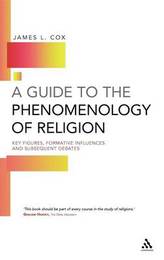
|
A Guide to the Phenomenology of Religion: Key Figures, Formative Influences and Subsequent Debates
Hardback
Main Details
| Title |
A Guide to the Phenomenology of Religion: Key Figures, Formative Influences and Subsequent Debates
|
| Authors and Contributors |
By (author) James L. Cox
|
| Physical Properties |
| Format:Hardback | | Pages:276 | | Dimensions(mm): Height 234,Width 156 |
|
| Category/Genre | Phenomenology and Existentialism
Philosophy of religion |
|---|
| ISBN/Barcode |
9780826452900
|
| Classifications | Dewey:200.72 |
|---|
| Audience | | Undergraduate | | Postgraduate, Research & Scholarly | | Professional & Vocational | |
|---|
|
Publishing Details |
| Publisher |
Bloomsbury Publishing PLC
|
| Imprint |
Continuum International Publishing Group Ltd.
|
| Publication Date |
15 June 2006 |
| Publication Country |
United Kingdom
|
Description
The phenomenological method in the study of religions has provided the linchpin supporting the argument that Religious Studies constitutes an academic discipline in its own right and thus that it is irreducible either to theology or to the social sciences. This book examines the figures whom the author regards as having been most influential in creating a phenomenology of religion. Background factors drawn from philosophy, theology and the social sciences are traced before examining the thinking of scholars within the Dutch, British and North American 'schools' of religious phenomenology.
Author Biography
James L. Cox is Emeritus Professor of Religious Studies, University of Edinburgh, UK and Adjunct Professor in the Religion and Society Research Cluster, Western Sydney University, Australia.
Reviews'In less capable hands, the biographies of leading scholars may show us how Religious Studies has evolved, but in this book Cox offers something far more exciting and important. He shows us what it has meant, what it means and what it might yet mean to study religion. In this accessible and engaging book he challenges students of religion to be clear about what we study and how we might study it better. This book should be part of every course in the Study of Religions.' Graham Harvey, Lecturer in Religious Studies, The Open University 'This book is a timely and important analysis for all those studying and researching religions as it examines both the historical and cultural dimensions of some key stages and issues in this academic field. The focus on phenomenologists acknowledges their importance in the development of the religious studies as an interdisciplinary field and highlights the way they have engendered important contemporary and cutting edge debates. The work is both scholarly in its rigor and has balance in the way it engages with criticism. There are many original and very up to date suggestions about possible ways in which debates about methods, scholarly perspectives and the the issue of the social engagement of academics might be viewed.' Peggy Morgan, Lecturer in the Study of Religions, Mansfield College, University of Oxford 'At a time when news programmes are full of stories about religion, the study of religious phenomena in their own right is more important than ever before. In this new book, James L. Cox - a recognised specialist - analyses the key thinkers and the main schools that have formed today's critical thought in the phenomenology of religion. Using a historical approach, he shows their continuing relevance for current debates in the study of religion. This includes the controversial topic of engagement by scholars of religion in the social and political questions of our time. Well organised and clearly written, this comprehensive and illuminating guide will be invaluable both to teachers and students.' Gerrie ter Haar, Professor of Religion, Human Rights and Social Change, Institute of Social Studies, The Hague, The Netherlands "This important book offers a detailed account of debates within the field of phenomoenology of religion... [It] will greatly interest those concerned with such academic issues and is to be valued as a contribution to the debate." Reviewed by Douglas J. Davies in Theology, 2008 "Cox's book is a mine of information." Reviewed in International Review of Biblical Studies, 2007. "the Guide will be helpful to anyone who wants to understand the nature of phenomenological thinking about religion, its historical roots and the on-going debates within religious studies that it has generated" Temenos (Nordic Journal of Comparative Religion), 2008 -- Teuvo Laitila "James Cox offers a succinct but powerful guide to the foundational method utilized by Religious Studies scholars... Cox offers an invaluable Guide to the benefits and demerits of all current approaches to studying" Graham Harvey, Expository Times, September 2007 -- Graham Harvey * Expository Times *
|